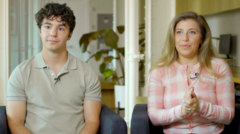In a significant legal decision, a federal judge in New York has ruled that a lawsuit filed by voice-over artists Paul Skye Lehrman and Linnea Sage against AI voice startup Lovo Inc. can continue. The artists claim that their voices were unlawfully appropriated by the company for its artificial intelligence services. Although the judge dismissed claims relating to federal copyright infringement, key allegations of breach of contract and deceptive business practices will proceed.
Lovo, a California-based firm, sought to have the entire case dismissed, a move that the company has not publicly commented on since the ruling. This legal dispute is part of a growing wave of lawsuits from creative professionals contending that their work has been misused to train AI models without their approval. Steve Cohen, the attorney representing the artists, celebrated the judge's decision as a major victory, expressing confidence that a jury will ultimately hold technology firms accountable for their actions.
The lawsuit emerged when Lehrman and Sage learned that their voices had been replicated and were being marketed on Lovo's text-to-speech platform, Genny. The couple had initially engaged with Lovo personnel for voice-over work on the online freelancing site Fiverr, with claims that their voices would only be used for "internal" academic research and testing purposes.
However, while driving in New York City, Lehrman was taken aback to hear what appeared to be his own voice speaking on a podcast about AI's impact on Hollywood. "We needed to pull the car over," he told reporters, emphasizing the surreal irony as he listened to an AI discussing job insecurities in the entertainment industry while imitating him.
The couple later discovers that clones of their voices, marketed as Kyle Snow and Sally Coleman, were available on Lovo's platform and had also been controversially used in a fundraising video and a YouTube advertisement. Following the uproar, Lovo removed the cloned voices, citing their lack of popularity. The case is now set to further unfold in the US District Court in Manhattan, as more artists navigate these complex intersections of technology and creative rights.




















